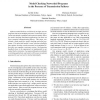Free Online Productivity Tools
i2Speak
i2Symbol
i2OCR
iTex2Img
iWeb2Print
iWeb2Shot
i2Type
iPdf2Split
iPdf2Merge
i2Bopomofo
i2Arabic
i2Style
i2Image
i2PDF
iLatex2Rtf
Sci2ools
105
click to vote
TASE
2007
IEEE
2007
IEEE
Model Checking Networked Programs in the Presence of Transmission Failures
Software model checkers work directly on single-process programs, but not on multiple processes. Conversion of processes into threads, combined with a network model, allows for model checking distributed applications, but does not cover potential communication failures. This paper contributes a fault model for model checking networked programs. If a naïve fault model is used, spurious deadlocks may appear, because certain processes are terminated before they can complete a necessary action. Such spurious deadlocks have to be suppressed, as implemented in our model checker extension. Our approach found several faults in existing applications, and scales well because exceptions generated by our tool can be checked individually.
Related Content
| Added | 04 Jun 2010 |
| Updated | 04 Jun 2010 |
| Type | Conference |
| Year | 2007 |
| Where | TASE |
| Authors | Cyrille Artho, Christian Sommer 0002, Shinichi Honiden |
Comments (0)

